Unit 2 What time do you go to school-Section A Gramma rFocus-3c语法课件22张
文档属性
| 名称 | Unit 2 What time do you go to school-Section A Gramma rFocus-3c语法课件22张 |  | |
| 格式 | zip | ||
| 文件大小 | 2.5MB | ||
| 资源类型 | 教案 | ||
| 版本资源 | 人教新目标(Go for it)版 | ||
| 科目 | 英语 | ||
| 更新时间 | 2022-02-15 09:29:30 | ||
图片预览

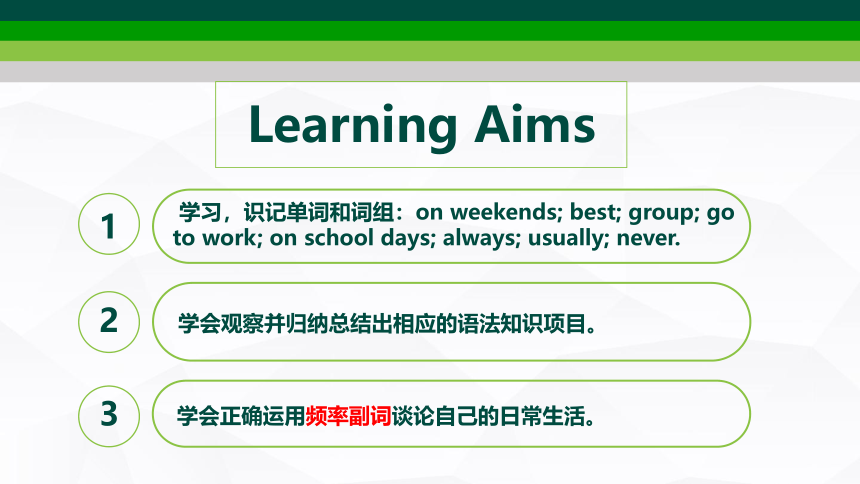
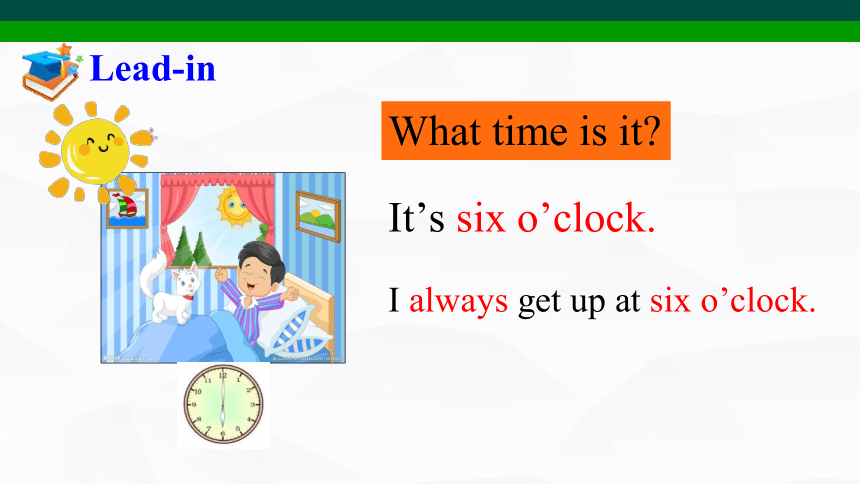
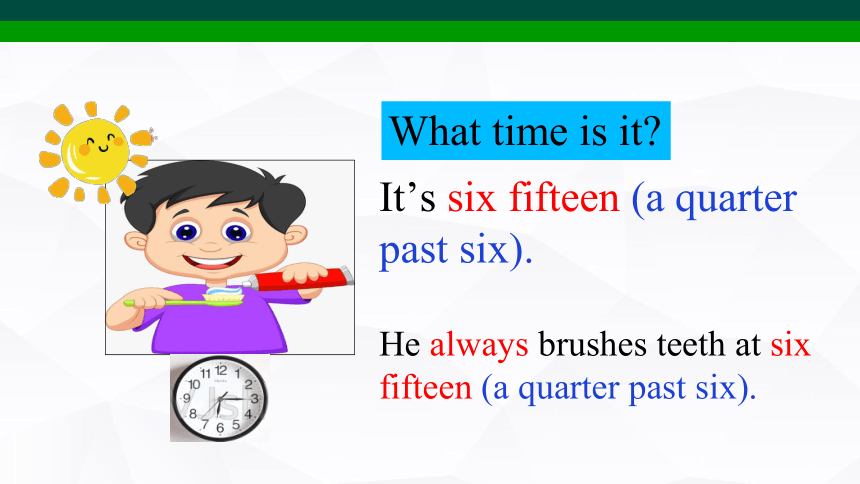
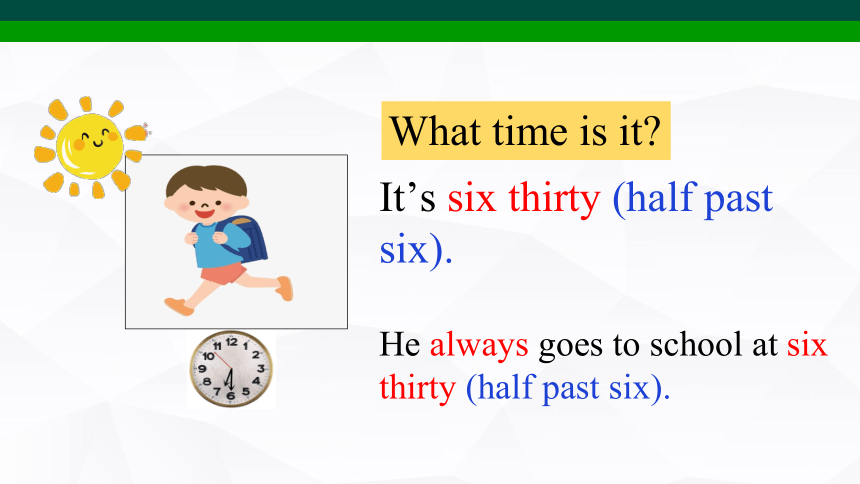
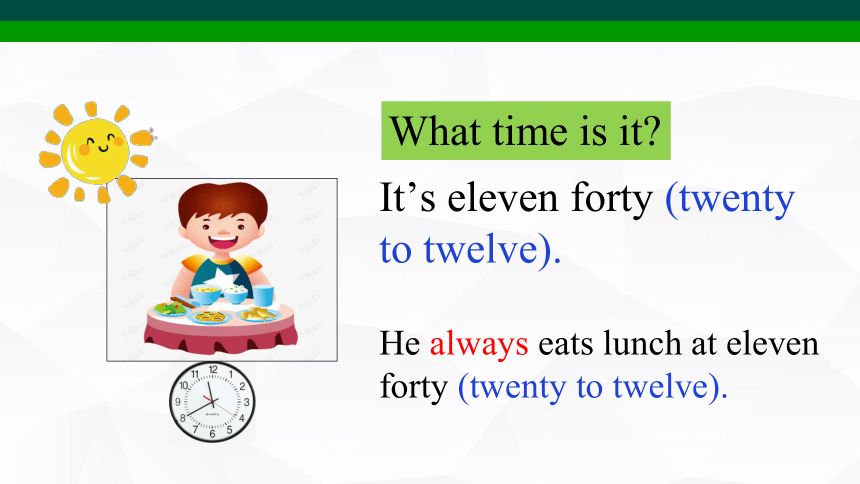

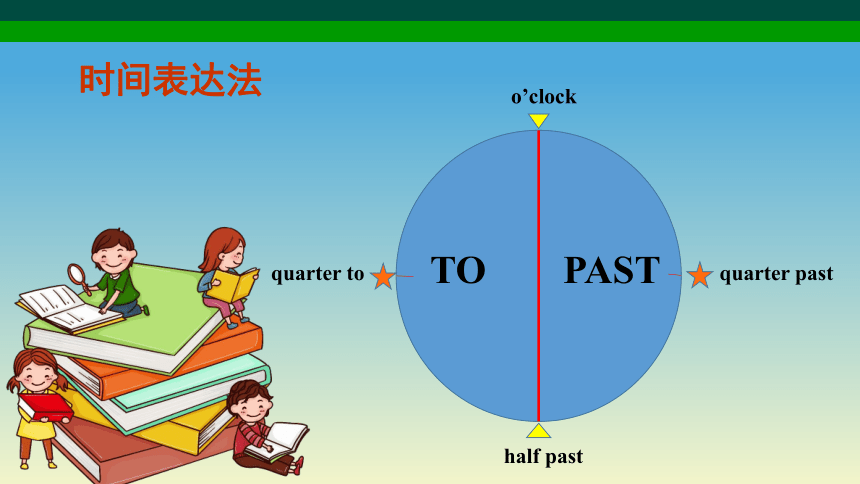
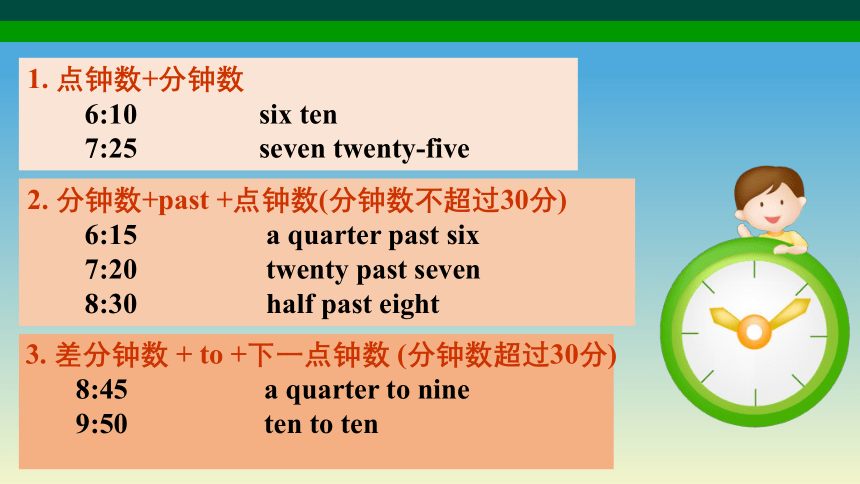
文档简介
(共22张PPT)
Section A Grammar Focus-3c
Unit2 What time do you go
to school
学习,识记单词和词组:on weekends; best; group; go
to work; on school days; always; usually; never.
学会观察并归纳总结出相应的语法知识项目。
学会正确运用频率副词谈论自己的日常生活。
1
2
3
Learning Aims
Lead-in
What time is it
It’s six o’clock.
I always get up at six o’clock.
What time is it
It’s six fifteen (a quarter past six).
He always brushes teeth at six fifteen (a quarter past six).
What time is it
It’s six thirty (half past six).
He always goes to school at six thirty (half past six).
What time is it
It’s eleven forty (twenty to twelve).
He always eats lunch at eleven forty (twenty to twelve).
Thinking...
结合前面的练习,思考一下:
如何用英语表达时间?
有哪些方式?
时间表达法
TO
PAST
half past
o’clock
quarter past
quarter to
1. 点钟数+分钟数
6:10 six ten
7:25 seven twenty-five
2. 分钟数+past +点钟数(分钟数不超过30分)
6:15 a quarter past six
7:20 twenty past seven
8:30 half past eight
3. 差分钟数 + to +下一点钟数 (分钟数超过30分)
8:45 a quarter to nine
9:50 ten to ten
Grammar Focus
What time do you usually get up I usually get up at six thirty.
What time do they get dressed They always get dressed at seven twenty.
What time does Rick eat breakfast He eats breakfast at seven o’clock.
When does Scott go to work He always goes to work at eleven o’clock. He’s never late.
When do your friends exercise They usually exercise on weekends.
Group 1:what time和when都是就时间提问,它们的回答有何异同?
Group 2:频度副词(usually, always, never)与动词的位置有何关系?
Group 3:在特殊疑问句中,单数第三人称(he, she)和其他人称在动词形式上有什么差异?
Divide the whole class into 3 groups and each group discusses one question.
Group work
when 和 what time 区别
Question 1
what time问题的回答仅仅为时刻,而针对when问题的回答还可以是更加笼统的时间,如: on weekends, in the morning等。
what time和when都是就时间提问,它们的回答有何异同?
Question 2
频率副词的位置
频度副词与动词的位置有何关系?
频度副词常位于实义动词之前,be动词之后。
Question 3
单数第三人称作主语时的助动词形式
在特殊疑问句中,单数第三人称(he, she)和其他人称在动词形式上有什么差异?
在问句中,单数第三人称前用助动词does,其他人称用do。
Grammar
what time 其问句的回答只能是具体的时刻。
when 其问句的回答可以是具体的时刻,也可以是年份、月份、日期等更笼统的时间。
1. when 和what time的区别
—What time/When does your mother go to work
你妈妈什么时候去上班?
— She goes to work at seven. 她七点钟去上班。
— What time is it now 现在几点了?
— It’s ten o’clock. 十点。
2.频度副词
1)不确定时间的副词always(总是),often(经常), usually(通常),sometimes(有时),seldom(很少),never(从不)等,这些副词表频度,表示经常性或习惯性的行为。
2)在句中位置:在be动词,情态动词或助动词之后,行为动词之前。
3)对频度副词提问用how often,且常用一般现在时。
always, usually, often, seldom,
never, sometimes 柱状图
3a
Write answers or questions. Use always, usually or never.
1. What time do you get up on school days
________________________________________
2. ________________________________________
Rick always gets up at 6:20.
3. What time do you have breakfast
________________________________________
4. ________________________________________
Anna never eats breakfast.
5. What time does your best friend go to school
_______________________________________
I usually get up at seven o’clock on school days.
What time does Rick always get up
I usually have breakfast at eight o’clock.
What time does Anna eat breakfast
She usually goes to school at six forty.
3b
Write about something you always do, something you usually do and something you never do.
1. always
_______________________________
2. usually
____________________________________
3. never
___________________________________
I always go to school at 7:00.
I usually play the piano at 9:30 on Sundays .
I never exercise in the evenings.
Words Sentences
always I always have breakfast at 6:25.
I always go to school at seven o’clock.
usually I usually have lunch at school.
I usually play the guitar at 6:00 p. m.
never I am never late for school.
I never watch TV on school days.
3c
Interview three of your classmates. Find out what time they do these activities. Then give a report to the class.
I usually .....
What time do you ....
Let’s talk!
Student 1 Name: ___ Student 2 Name: ___ Student 3
Name: ___
get up on weekends
exercise
eat dinner
take a shower
go to school
Thanks for your watching!
Thank you
Section A Grammar Focus-3c
Unit2 What time do you go
to school
学习,识记单词和词组:on weekends; best; group; go
to work; on school days; always; usually; never.
学会观察并归纳总结出相应的语法知识项目。
学会正确运用频率副词谈论自己的日常生活。
1
2
3
Learning Aims
Lead-in
What time is it
It’s six o’clock.
I always get up at six o’clock.
What time is it
It’s six fifteen (a quarter past six).
He always brushes teeth at six fifteen (a quarter past six).
What time is it
It’s six thirty (half past six).
He always goes to school at six thirty (half past six).
What time is it
It’s eleven forty (twenty to twelve).
He always eats lunch at eleven forty (twenty to twelve).
Thinking...
结合前面的练习,思考一下:
如何用英语表达时间?
有哪些方式?
时间表达法
TO
PAST
half past
o’clock
quarter past
quarter to
1. 点钟数+分钟数
6:10 six ten
7:25 seven twenty-five
2. 分钟数+past +点钟数(分钟数不超过30分)
6:15 a quarter past six
7:20 twenty past seven
8:30 half past eight
3. 差分钟数 + to +下一点钟数 (分钟数超过30分)
8:45 a quarter to nine
9:50 ten to ten
Grammar Focus
What time do you usually get up I usually get up at six thirty.
What time do they get dressed They always get dressed at seven twenty.
What time does Rick eat breakfast He eats breakfast at seven o’clock.
When does Scott go to work He always goes to work at eleven o’clock. He’s never late.
When do your friends exercise They usually exercise on weekends.
Group 1:what time和when都是就时间提问,它们的回答有何异同?
Group 2:频度副词(usually, always, never)与动词的位置有何关系?
Group 3:在特殊疑问句中,单数第三人称(he, she)和其他人称在动词形式上有什么差异?
Divide the whole class into 3 groups and each group discusses one question.
Group work
when 和 what time 区别
Question 1
what time问题的回答仅仅为时刻,而针对when问题的回答还可以是更加笼统的时间,如: on weekends, in the morning等。
what time和when都是就时间提问,它们的回答有何异同?
Question 2
频率副词的位置
频度副词与动词的位置有何关系?
频度副词常位于实义动词之前,be动词之后。
Question 3
单数第三人称作主语时的助动词形式
在特殊疑问句中,单数第三人称(he, she)和其他人称在动词形式上有什么差异?
在问句中,单数第三人称前用助动词does,其他人称用do。
Grammar
what time 其问句的回答只能是具体的时刻。
when 其问句的回答可以是具体的时刻,也可以是年份、月份、日期等更笼统的时间。
1. when 和what time的区别
—What time/When does your mother go to work
你妈妈什么时候去上班?
— She goes to work at seven. 她七点钟去上班。
— What time is it now 现在几点了?
— It’s ten o’clock. 十点。
2.频度副词
1)不确定时间的副词always(总是),often(经常), usually(通常),sometimes(有时),seldom(很少),never(从不)等,这些副词表频度,表示经常性或习惯性的行为。
2)在句中位置:在be动词,情态动词或助动词之后,行为动词之前。
3)对频度副词提问用how often,且常用一般现在时。
always, usually, often, seldom,
never, sometimes 柱状图
3a
Write answers or questions. Use always, usually or never.
1. What time do you get up on school days
________________________________________
2. ________________________________________
Rick always gets up at 6:20.
3. What time do you have breakfast
________________________________________
4. ________________________________________
Anna never eats breakfast.
5. What time does your best friend go to school
_______________________________________
I usually get up at seven o’clock on school days.
What time does Rick always get up
I usually have breakfast at eight o’clock.
What time does Anna eat breakfast
She usually goes to school at six forty.
3b
Write about something you always do, something you usually do and something you never do.
1. always
_______________________________
2. usually
____________________________________
3. never
___________________________________
I always go to school at 7:00.
I usually play the piano at 9:30 on Sundays .
I never exercise in the evenings.
Words Sentences
always I always have breakfast at 6:25.
I always go to school at seven o’clock.
usually I usually have lunch at school.
I usually play the guitar at 6:00 p. m.
never I am never late for school.
I never watch TV on school days.
3c
Interview three of your classmates. Find out what time they do these activities. Then give a report to the class.
I usually .....
What time do you ....
Let’s talk!
Student 1 Name: ___ Student 2 Name: ___ Student 3
Name: ___
get up on weekends
exercise
eat dinner
take a shower
go to school
Thanks for your watching!
Thank you
同课章节目录
- Unit 1 Can you play the guitar?
- Section A
- Section B
- Unit 2 What time do you go to school?
- Section A
- Section B
- Unit 3 How do you get to school?
- Section A
- Section B
- Unit 4 Don't eat in class.
- Section A
- Section B
- Unit 5 Why do you like pandas?
- Section A
- Section B
- Unit 6 I'm watching TV.
- Section A
- Section B
- Review of Units 1-6
- Unit 7 It's raining!
- Section A
- Section B
- Unit 8 Is there a post office near here?
- Section A
- Section B
- Unit 9 What does he look like?
- Section A
- Section B
- Unit 10 I'd like some noodles.
- Section A
- Section B
- Unit 11 How was your school trip?
- Section A
- Section B
- Unit 12 What did you do last weekend?
- Section A
- Section B
